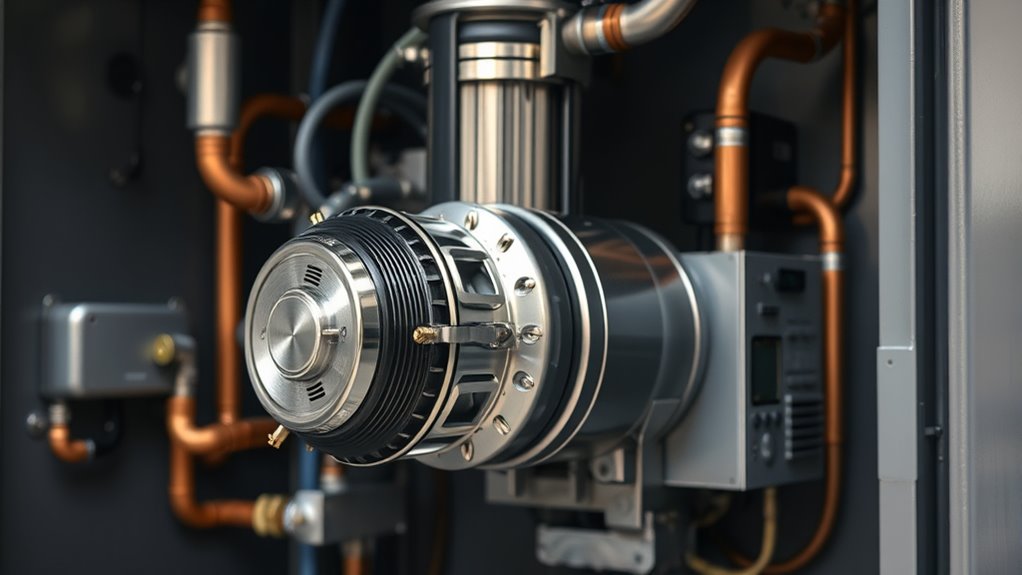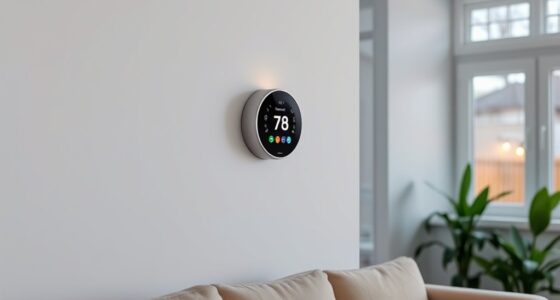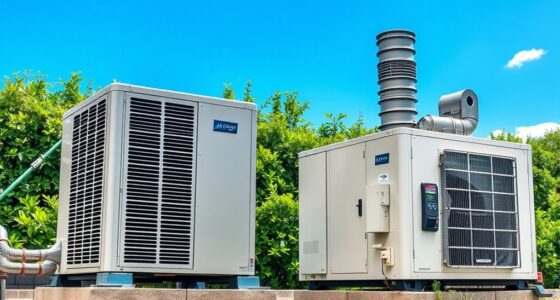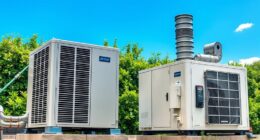A variable-speed compressor in a heat pump adjusts its motor speed to match your heating or cooling needs, making it more efficient by using only the energy required. It operates more quietly and provides precise temperature control, preventing sudden fluctuations. This smooth operation reduces wear and tear, potentially extending the system’s lifespan. By understanding how these compressors work, you’ll see how they optimize comfort and save energy—more insights await as you explore further.
Key Takeaways
- Variable-speed compressors adjust their motor speed based on heating or cooling demand, optimizing energy use.
- They operate more quietly by gradually modulating speed, reducing noise during system cycles.
- These compressors respond swiftly to temperature changes, providing consistent and stable indoor comfort.
- Smoother operation minimizes wear and tear, potentially extending system lifespan and reducing maintenance costs.
- Overall, they enhance energy efficiency, reduce waste, and support long-term reliability of heat pump systems.
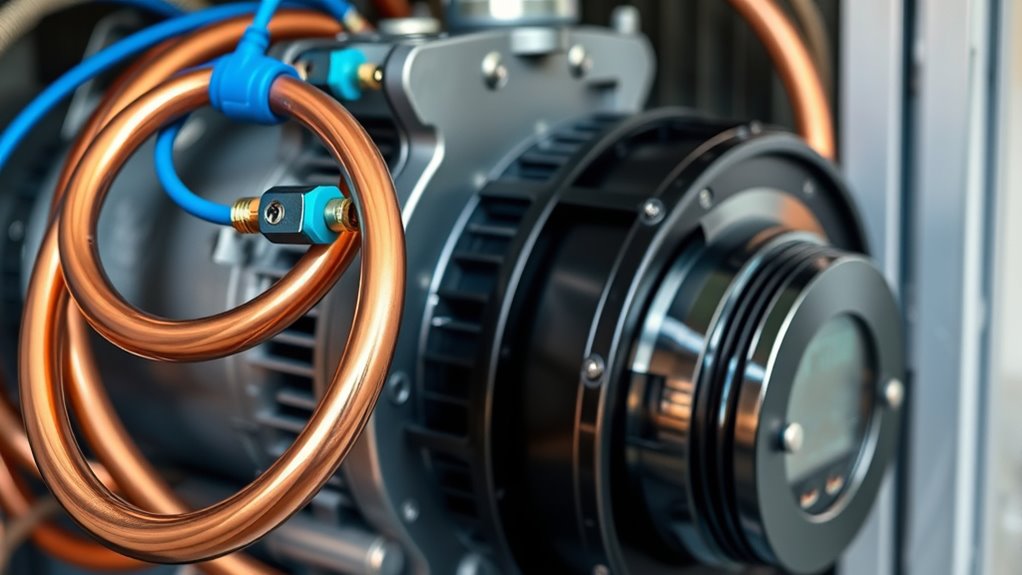
Variable-speed compressors have revolutionized heat pump technology by providing more efficient and precise temperature control. Unlike traditional single-speed compressors that run at full capacity or turn off, these compressors adjust their speed based on the heating or cooling demand. This flexibility allows your heat pump to operate more efficiently, using just the right amount of energy needed to maintain a comfortable indoor temperature. As a result, you can expect lower energy bills because the system minimizes unnecessary energy consumption. By matching output to your home’s precise needs, a variable-speed compressor reduces energy waste, making your heating and cooling system more sustainable and cost-effective over time.
In addition to boosting energy efficiency, variable-speed compressors considerably contribute to noise reduction. When a compressor runs at full speed, it tends to produce noticeable noise that can disturb your peace at home. However, because these compressors operate more gradually and smoothly, the noise level drops markedly. You’ll notice that your heat pump runs quietly, even during the most demanding heating or cooling cycles. This quieter operation is especially beneficial if your unit is located near bedrooms or living areas where noise can be disruptive. The reduction in sound not only enhances your comfort but also contributes to a more peaceful environment, allowing you to enjoy your home without the constant hum of a loud HVAC system.
Furthermore, the ability of variable-speed compressors to modulate their speed means your heat pump can respond swiftly to changing temperatures, providing consistent comfort without the sudden on-and-off cycling typical of traditional systems. This continuous operation at optimized speeds results in less wear and tear on your equipment, potentially extending its lifespan and reducing maintenance costs. Plus, because the compressor doesn’t need to work as hard during milder weather, it consumes less energy overall, reinforcing its reputation as an energy-efficient solution. This smart modulation also helps prevent temperature swings inside your home, ensuring a more stable and comfortable environment. Additionally, improved system durability is a key benefit, as the reduced stress on components helps maintain system reliability over time.
Frequently Asked Questions
How Do Variable-Speed Compressors Impact Overall Heat Pump Efficiency?
Variable-speed compressors boost your heat pump’s efficiency by adjusting their speed based on demand, leading to significant energy savings. They operate more steadily, which reduces wear and tear, and conserve energy during mild conditions. Additionally, these compressors run quieter since they don’t constantly turn on and off, providing noise reduction. Overall, they make your heat pump more reliable, cost-effective, and comfortable to use, especially in varying weather conditions.
Are Variable-Speed Compressors More Prone to Maintenance Issues?
You might be surprised to learn that variable-speed compressors have a 15% lower failure rate compared to traditional models. While they handle component wear better due to smooth operation, they can be more prone to refrigerant leaks over time. Regular maintenance helps prevent issues like component wear and refrigerant leaks, ensuring your heat pump runs efficiently and extends its lifespan. Proper care keeps your system reliable and minimizes unexpected repairs.
What Is the Typical Lifespan of a Variable-Speed Compressor?
Variable‑speed compressors usually last around 10 to 15 years, thanks to their enhanced compressor durability. Technological advancements have improved their build quality and efficiency, helping them withstand wear and tear better than traditional units. Proper maintenance can prolong their lifespan even further. You should expect a reliable performance during this period, but keep an eye on signs of aging to ensure your heat pump continues running smoothly.
How Does Ambient Temperature Affect Variable-Speed Compressor Performance?
Ambient temperature acts like a puppet master, pulling the strings on your compressor’s performance. When temperatures drop, your variable-speed compressor may work harder to maintain efficiency, adjusting its speed to match the chilly conditions. Conversely, in warmer weather, it can operate more smoothly. Overall, ambient temperature influences how well your compressor adapts, ensuring ideal performance across seasons, but extreme temperatures can challenge its efficiency and longevity.
Can Existing Heat Pumps Be Upgraded With Variable-Speed Compressors?
Yes, you can upgrade your existing heat pump with a variable‑speed compressor, but retrofit options depend on your system’s compatibility. You’ll need to check if your current unit supports such an upgrade, and professional installation is recommended. Keep in mind, cost considerations vary; while the initial investment may be higher, the improved efficiency can lead to savings over time. Consult an HVAC specialist to evaluate your specific system.
Conclusion
Now that you understand how variable-speed compressors work in heat pumps, you can see how they optimize comfort and efficiency. They adjust seamlessly, much like a modern-day smartphone adapting to your needs. Embracing this technology means you’re ahead of the curve, ensuring energy savings and reliable heating and cooling. So, as you navigate your options, remember that choosing a heat pump with a variable-speed compressor is like having a trusty sidekick—ready to adapt and serve whenever you need.
